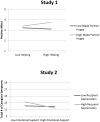Spouses' daily feelings of appreciation and self-reported well-being
- PMID: 28726476
- PMCID: PMC5800303
- DOI: 10.1037/hea0000527
Spouses' daily feelings of appreciation and self-reported well-being
Abstract
Objective: Research shows that active support provision is associated with greater well-being for spouses of individuals with chronic conditions. However, not all instances of support may be equally beneficial for spouses' well-being. The theory of communal responsiveness suggests that because spouses' well-being is interdependent, spouses benefit most from providing support when they believe their support increases their partner's happiness and is appreciated. Two studies tested this hypothesis.
Method: Study 1 was a 7-day ecological momentary assessment (EMA) study of 73 spouses of persons with dementia (74%) and other conditions. In Study 1, spouses self-reported active help, perceptions of how happy the help made the partner and how much the help improved the partner's well-being, and spouses' positive and negative affect at EMA time points. Study 2 was a 7-day daily assessment study of 43 spouses of persons with chronic pain in which spouses reported their emotional support provision, perceived partner appreciation, and their own physical symptoms.
Results: Study 1 showed that active help was associated with more positive affect for spouses when they perceived the help increased their partner's happiness and improved their partner's well-being. Study 2 showed that emotional support provision was associated with fewer spouse reported physical symptoms when perceptions of partner appreciation were high.
Conclusion: Results suggest that interventions for spouses of individuals with chronic conditions take into account spouses' perceptions of their partners' positive emotional responses. Highlighting the positive consequences of helping may increase spouses' well-being. (PsycINFO Database Record
(c) 2017 APA, all rights reserved).
Figures

Similar articles
-
Spouses' involvement in their partners' diabetes management: associations with spouse stress and perceived marital quality.J Fam Psychol. 2013 Oct;27(5):712-21. doi: 10.1037/a0034181. Epub 2013 Sep 16. J Fam Psychol. 2013. PMID: 24040902 Free PMC article.
-
Dyadic Associations Between Physical Activity and Depressive Symptoms in Older Adults with Musculoskeletal Conditions and Their Spouses.Stress Health. 2016 Aug;32(3):244-52. doi: 10.1002/smi.2603. Epub 2014 Jul 23. Stress Health. 2016. PMID: 25053173 Free PMC article.
-
Older spouses' perceptions of partners' chronic arthritis pain: implications for spousal responses, support provision, and caregiving experiences.Psychol Aging. 2006 Jun;21(2):222-230. doi: 10.1037/0882-7974.21.2.222. Psychol Aging. 2006. PMID: 16768570
-
Intimacy, sexual satisfaction, and sexual distress in vulvodynia couples: An observational study.Health Psychol. 2016 Jun;35(6):531-540. doi: 10.1037/hea0000289. Epub 2015 Dec 21. Health Psychol. 2016. PMID: 26690636
-
Living with a partner with dementia: a systematic review and thematic synthesis of spouses' lived experiences of changes in their everyday lives.Aging Ment Health. 2019 May;23(5):541-550. doi: 10.1080/13607863.2018.1433634. Epub 2018 Feb 6. Aging Ment Health. 2019. PMID: 29405735
Cited by
-
Laughter and short-term blood pressure reactivity in middle-aged and older adult spousal support interactions.Health Psychol. 2021 Nov;40(11):764-773. doi: 10.1037/hea0001136. Health Psychol. 2021. PMID: 34914482 Free PMC article.
-
Experimental paradigm to test the effects of providing social support: study protocol of the PROSPECT trial (Study 2).BMC Psychol. 2025 Jan 27;13(1):74. doi: 10.1186/s40359-024-02319-y. BMC Psychol. 2025. PMID: 39871367 Free PMC article.
-
Supporting a Spouse With Military Posttraumatic Stress: Daily Associations With Partners' Affect.J Trauma Stress. 2019 Apr;32(2):323-329. doi: 10.1002/jts.22390. Epub 2019 Mar 20. J Trauma Stress. 2019. PMID: 30892736 Free PMC article.
-
The use of ecological momentary assessment for family caregivers of adults with chronic conditions: A systematic review.Health Psychol Res. 2024 Mar 1;12:93907. doi: 10.52965/001c.93907. eCollection 2024. Health Psychol Res. 2024. PMID: 38435338 Free PMC article.
-
Longitudinal Associations of Global and Daily Support with Marital Status.Am J Fam Ther. 2022;50(3):280-294. doi: 10.1080/01926187.2021.1913667. Epub 2021 Apr 22. Am J Fam Ther. 2022. PMID: 35602589 Free PMC article.
References
-
- Adelman RD, Tmanova LL, Delgado D, Dion S, Lachs MS. Caregiver burden: a clinical review. JAMA. 2014;311:1052–1060. - PubMed
-
- Algoe S, Fredrickson BL, Gable SL. The social functions of the emotion of gratitude via expression. Emotion. 2013;13(4):605–609. - PubMed
-
- Amaro L, Miller K. Discussion of care, contribution, and perceived (in) gratitude in the family caregiver and sibling relationship. Personal Relationships. 2016;23:98–110.
-
- Batson CD. Prosocial Motivation: Is it ever Truly Altruistic? In: Leonard B, editor. Advances in experimental social psychology. Vol. 20. Academic Press; 1987. pp. 65–122.
-
- Brown S, Brown R. Connecting prosocial behavior to improved physical health: Contributions from the neurobiology of parenting. Neuroscience & Biobehavioral Reviews. 2015;55:1–17. - PubMed
MeSH terms
Grants and funding
LinkOut - more resources
Full Text Sources
Other Literature Sources
Research Materials

